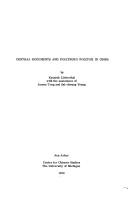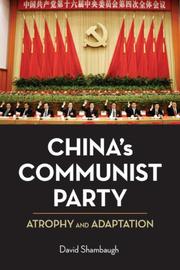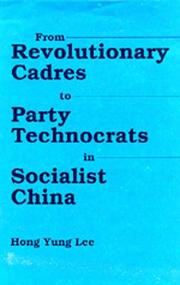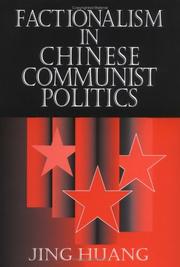| Listing 1 - 10 of 33 | << page >> |
Sort by
|

ISBN: 0892640332 0472901494 0472127543 9780472127542 9780472901494 Year: 1978 Volume: 33 Publisher: Ann Arbor, Michigan : University of Michigan Press,
Abstract | Keywords | Export | Availability | Bookmark
 Loading...
Loading...Choose an application
- Reference Manager
- EndNote
- RefWorks (Direct export to RefWorks)
Government publications --- Chung-kuo kung ch'an tang. --- China --- Chine --- Politics and government --- Politique et gouvernement --- Zhongguo gong chan dang. --- Chung-kuo kung chʻan tang. --- Quzhou Xian (Hebei Sheng, China) --- Documents --- Government documents --- Official publications --- Public documents --- Publications --- 中国共产党.中央政治局 --- 中国共产党. --- 中国共產党. --- 中國共產黨. --- 中國共産党. --- 中國共産黨. --- Chʻü-chou hsien (Hebei Sheng, China) --- 曲周县 (Hebei Sheng, China) --- 中国共産党. --- Zhong gong zhong yang --- 中共中央
Book
ISBN: 1316397068 1316399265 1316400883 131639980X 1316398684 113997680X 1107082021 1107442206 1316393828 9781139976800 9781316398685 9781107082021 Year: 2015 Publisher: Cambridge : Cambridge University Press,
Abstract | Keywords | Export | Availability | Bookmark
 Loading...
Loading...Choose an application
- Reference Manager
- EndNote
- RefWorks (Direct export to RefWorks)
Nominally the highest decision-making body in the Chinese Communist Party, the Party Congress is responsible for determining party policy and the selection of China's leaders. Guoguang Wu provides the first analysis of how the Party Congress operates to elect Party leadership and decide Party policy, and explores why such a formal performance of congress meetings, delegate discussions, and non-democratic elections is significant for authoritarian politics more broadly. Taking institutional inconsistency as the central research question, this study presents a new theory of 'mutual contextualization' to reveal how informal politics and formal institutions interact with each other. Wu argues that despite the prevalence of informal politics behind the scenes, authoritarian politics seeks legitimization through a combination of political manipulation and the ritual mobilization of formal institutions. This ambitious book is essential reading for all those interested in understanding contemporary China, and an innovative theoretical contribution to the study of comparative politics.
Political leadership --- Zhongguo gong chan dang. --- Zhongguo gong chan dang --- Zhong guo gong chan dang --- Chung-kuo kung chʻan tang --- Chūgoku Kyōsantō --- Chungguk Kongsandang --- 中国共产党 --- 中國共產黨 --- КПК --- KPK --- Komunistická strana Číny --- Komunistička partija Kine --- Communist Party of China --- Chinese Communist Party --- Communist Party (China) --- Gong chan dang (China) --- 共产党 (China) --- Коммунистическая партия Китая --- Kommunisticheskai︠a︡ partii︠a︡ Kitai︠a︡ --- Shina Kyōsantō --- Китайска комунистическа партия --- Kitaĭska komunisticheska partii︠a︡ --- Partido Comunista de China --- PCCh --- Parti communiste chinois --- CCP --- Partito comunista cinese --- KPCh --- Kommunistische Partei Chinas --- К.П.К. --- K.P.K. --- CPC --- C.C.P. --- Partia Komuniste të Kinës --- Đảng cộng sản Trung quốc --- Zhong gong --- 中共 --- Pcc --- P.C. Chino --- ХКН --- KhKN --- Хятадын Коммунист нам --- Khi︠a︡tadyn Kommunist nam --- Chung-kuo kung chʻan tang. --- 中国共产党. --- Party work. --- Platforms. --- China --- Politics and government

ISBN: 9780520254923 0520254929 Year: 2008 Publisher: Washington, D.C. Woodrow Wilson Center
Abstract | Keywords | Export | Availability | Bookmark
 Loading...
Loading...Choose an application
- Reference Manager
- EndNote
- RefWorks (Direct export to RefWorks)
Political parties --- China --- Zhongguo gong chan dang. --- Zhong guo gong chan dang --- Chung-kuo kung chʻan tang --- Chūgoku Kyōsantō --- Chungguk Kongsandang --- 中国共产党 --- 中國共產黨 --- КПК --- KPK --- Komunistická strana Číny --- Komunistička partija Kine --- Communist Party of China --- Chinese Communist Party --- Communist Party (China) --- Gong chan dang (China) --- 共产党 (China) --- Коммунистическая партия Китая --- Kommunisticheskai︠a︡ partii︠a︡ Kitai︠a︡ --- Shina Kyōsantō --- Китайска комунистическа партия --- Kitaĭska komunisticheska partii︠a︡ --- Partido Comunista de China --- PCCh --- Parti communiste chinois --- CCP --- Partito comunista cinese --- KPCh --- Kommunistische Partei Chinas --- К.П.К. --- K.P.K. --- CPC --- C.C.P. --- Partia Komuniste të Kinës --- Đảng cộng sản Trung quốc --- Zhong gong --- 中共 --- Pcc --- P.C. Chino --- ХКН --- KhKN --- Хятадын Коммунист нам --- Khi︠a︡tadyn Kommunist nam --- Politics and government --- Economic conditions --- Communism --- Zhongguo gongchandang --- Communisme --- Chine --- 1976-.... --- Politique et gouvernement --- 1997-....
Book
ISBN: 9781107090637 9781316109175 9781107462793 9781316358368 1316358364 1316109178 9781316364765 1316364763 9781316363768 1316363767 1107090636 1107462797 1316355365 1316361764 1316362760 9781316355367 9781316361764 9781316362761 Year: 2015 Publisher: Cambridge : Cambridge University Press,
Abstract | Keywords | Export | Availability | Bookmark
 Loading...
Loading...Choose an application
- Reference Manager
- EndNote
- RefWorks (Direct export to RefWorks)
Charlotte P. Lee considers organizational changes taking place within the contemporary Chinese Communist Party (CCP), examining the party's renewed emphasis on an understudied but core set of organizations: party-managed training academies or 'party schools'. This national network of organizations enables party authorities to exert political control over the knowledge, skills, and careers of officials. Drawing on in-depth field research and novel datasets, Lee finds that the party school system has not been immune to broader market-based reforms but instead has incorporated many of the same strategies as actors in China's hybrid, state-led private sector. In the search for revenue and status, schools have updated training content and become more entrepreneurial as they compete and collaborate with domestic and international actors. This book draws attention to surprising dynamism located within the party, in political organizations thought immune to change, and the transformative effect of the market on China's political system.
Zhongguo gong chan dang. --- China --- Politics and government --- S06/0425 --- China: Politics and government--Organization and structure of the CCP --- Zhong guo gong chan dang --- Chung-kuo kung chʻan tang --- Chūgoku Kyōsantō --- Chungguk Kongsandang --- 中国共产党 --- 中國共產黨 --- КПК --- KPK --- Komunistická strana Číny --- Komunistička partija Kine --- Communist Party of China --- Chinese Communist Party --- Communist Party (China) --- Gong chan dang (China) --- 共产党 (China) --- Коммунистическая партия Китая --- Kommunisticheskai︠a︡ partii︠a︡ Kitai︠a︡ --- Shina Kyōsantō --- Китайска комунистическа партия --- Kitaĭska komunisticheska partii︠a︡ --- Partido Comunista de China --- PCCh --- Parti communiste chinois --- CCP --- Partito comunista cinese --- KPCh --- Kommunistische Partei Chinas --- К.П.К. --- K.P.K. --- CPC --- C.C.P. --- Partia Komuniste të Kinës --- Đảng cộng sản Trung quốc --- Zhong gong --- 中共 --- Pcc --- P.C. Chino --- ХКН --- KhKN --- Хятадын Коммунист нам --- Khi︠a︡tadyn Kommunist nam

ISBN: 0520066790 058513099X Year: 1991 Publisher: Berkeley : University of California Press,
Abstract | Keywords | Export | Availability | Bookmark
 Loading...
Loading...Choose an application
- Reference Manager
- EndNote
- RefWorks (Direct export to RefWorks)
S06/0425 --- Communist leadership --- -Communism and leadership --- Leadership --- China: Politics and government--Organization and structure of the CCP --- History --- Zhongguo gong chan dang --- -Zhong guo gong chan dang --- Chung-kuo kung chʻan tang --- Chūgoku Kyōsantō --- Chungguk Kongsandang --- 中国共产党 --- 中國共產黨 --- КПК --- KPK --- Komunistická strana Číny --- Komunistička partija Kine --- Communist Party of China --- Chinese Communist Party --- Communist Party (China) --- Gong chan dang (China) --- 共产党 (China) --- Коммунистическая партия Китая --- Kommunisticheskai︠a︡ partii︠a︡ Kitai︠a︡ --- Shina Kyōsantō --- Китайска комунистическа партия --- Kitaĭska komunisticheska partii︠a︡ --- Partido Comunista de China --- PCCh --- Parti communiste chinois --- CCP --- Partito comunista cinese --- KPCh --- Kommunistische Partei Chinas --- К.П.К. --- K.P.K. --- CPC --- C.C.P. --- Partia Komuniste të Kinës --- Đảng cộng sản Trung quốc --- Zhong gong --- 中共 --- Pcc --- P.C. Chino --- ХКН --- KhKN --- Хятадын Коммунист нам --- Khi︠a︡tadyn Kommunist nam --- Communism and leadership --- Zhong guo gong chan dang --- History. --- Government - Non-U.S. --- Law, Politics & Government --- Government - Asia
Book

ISBN: 0892640022 0472902121 Year: 2020 Publisher: Baltimore, Maryland : Project Muse,
Abstract | Keywords | Export | Availability | Bookmark
 Loading...
Loading...Choose an application
- Reference Manager
- EndNote
- RefWorks (Direct export to RefWorks)
The Chinese Communist system was from its very inception based on an inherent contradiction and tension, and the Cultural Revolution is the latest and most violent manifestation of that contradiction. Built into the very structure of the system was an inner conflict between the desiderata, the imperatives, and the requirements that technocratic modernization on the one hand and Maoist values and strategy on the other. The Cultural Revolution collects four papers prepared for a research conference on the topic convened by the University of Michigan Center for Chinese Studies in March 1968. Michel Oksenberg opens the volume by examining the impact of the Cultural Revolution on occupational groups including peasants, industrial managers and workers, intellectuals, students, party and government officials, and the military. Carl Riskin is concerned with the economic effects of the revolution, taking up production trends in agriculture and industry, movements in foreign trade, and implications of Masoist economic policies for China’s economic growth. Robert A. Scalapino turns to China’s foreign policy behavior during this period, arguing that Chinese Communists in general, and Mao in particular, formed foreign policy with a curious combination of cosmic, utopian internationalism and practical ethnocentrism rooted both in Chinese tradition and Communist experience. Ezra F. Vogel closes the volume by exploring the structure of the conflict, the struggles between factions, and the character of those factions.
China --- Economic conditions --- History --- Zhongguo gong chan dang --- Purges. --- Zhong guo gong chan dang --- Chung-kuo kung chʻan tang --- Chūgoku Kyōsantō --- Chungguk Kongsandang --- 中国共产党 --- 中國共產黨 --- КПК --- KPK --- Komunistická strana Číny --- Komunistička partija Kine --- Communist Party of China --- Chinese Communist Party --- Communist Party (China) --- Gong chan dang (China) --- 共产党 (China) --- Коммунистическая партия Китая --- Kommunisticheskai︠a︡ partii︠a︡ Kitai︠a︡ --- Shina Kyōsantō --- Китайска комунистическа партия --- Kitaĭska komunisticheska partii︠a︡ --- Partido Comunista de China --- PCCh --- Parti communiste chinois --- CCP --- Partito comunista cinese --- KPCh --- Kommunistische Partei Chinas --- К.П.К. --- K.P.K. --- CPC --- C.C.P. --- Partia Komuniste të Kinës --- Đảng cộng sản Trung quốc --- Zhong gong --- 中共 --- Pcc --- P.C. Chino --- ХКН --- KhKN --- Хятадын Коммунист нам --- Khi︠a︡tadyn Kommunist nam

ISBN: 0511571682 0521622840 052103258X Year: 2000 Publisher: Cambridge : Cambridge University Press,
Abstract | Keywords | Export | Availability | Bookmark
 Loading...
Loading...Choose an application
- Reference Manager
- EndNote
- RefWorks (Direct export to RefWorks)
Factionalism is widely understood to be a distinguishing characteristic of Chinese politics. In this book, first published in 2000, Jing Huang examines the role of factionalism in leadership relations and policy-making. His detailed knowledge of intra-party politics offers an alternative understanding of still-disputed struggles behind the high walls of leadership in Zhongnanhai. Huang traces the development of factional politics from its roots in the 'mountaintops' and the enduring impact of the personal bonds formed between Mao and his supporters at the Yan'an Round Table. Critiquing the predominant theories on leadership and decision-making, he explains that it is not power struggles that give rise to factionalism, but rather the existence of 'factionalism that turns power into an overriding goal in CCP politics'. Huang explains why policy outcomes switched constantly between 'Left-adventurism' and 'Right-conservatism' under Mao's reign and between 'emancipation of mind' and 'socialist spiritual civilization' in the Deng era.
Political purges --- Lustration (Political purges) --- Political parties --- Political party purges --- Purges, Political --- Purges --- Zhongguo gong chan dang --- Zhong guo gong chan dang --- Chung-kuo kung chʻan tang --- Chūgoku Kyōsantō --- Chungguk Kongsandang --- 中国共产党 --- 中國共產黨 --- КПК --- KPK --- Komunistická strana Číny --- Komunistička partija Kine --- Communist Party of China --- Chinese Communist Party --- Communist Party (China) --- Gong chan dang (China) --- 共产党 (China) --- Коммунистическая партия Китая --- Kommunisticheskai︠a︡ partii︠a︡ Kitai︠a︡ --- Shina Kyōsantō --- Китайска комунистическа партия --- Kitaĭska komunisticheska partii︠a︡ --- Partido Comunista de China --- PCCh --- Parti communiste chinois --- CCP --- Partito comunista cinese --- KPCh --- Kommunistische Partei Chinas --- К.П.К. --- K.P.K. --- CPC --- C.C.P. --- Partia Komuniste të Kinës --- Đảng cộng sản Trung quốc --- Zhong gong --- 中共 --- Pcc --- P.C. Chino --- ХКН --- KhKN --- Хятадын Коммунист нам --- Khi︠a︡tadyn Kommunist nam --- History. --- China --- Politics and government --- Social Sciences --- Political Science
Book
ISBN: 1108635016 1108575277 1108480497 1108573649 1108727565 Year: 2019 Publisher: Cambridge : Cambridge University Press,
Abstract | Keywords | Export | Availability | Bookmark
 Loading...
Loading...Choose an application
- Reference Manager
- EndNote
- RefWorks (Direct export to RefWorks)
The desire for the 'core' leader has been imbedded in the ruling philosophy of the Chinese Communist Party. As the role of the 'core' leader and his interactions with other ruling elite are important in understanding Chinese politics, this book attempts to focus on the role of the party chief and how he could become the 'core' of the leadership. Xuezhi Guo provides the most detailed and comprehensive scrutiny of the 'core' of the Chinese Communist Party leadership and meticulously analyses the cultural, philosophical, and ideological origins as well as its evolution throughout the party's history. This study introduces an eclectic approach that integrates the most useful analytical perspectives and insights from Chinese political history, philosophy, and mainstream Western methodologies in order to explain the consistent patterns of elite politics and the behavior of the party's high-ranking leaders during times of cooperation and conflict from Mao Zedong to Xi Jinping.
Communist leadership --- Political leadership --- Zhongguo gong chan dang. --- Zhong guo gong chan dang --- Chung-kuo kung chʻan tang --- Chūgoku Kyōsantō --- Chungguk Kongsandang --- 中国共产党 --- 中國共產黨 --- КПК --- KPK --- Komunistická strana Číny --- Komunistička partija Kine --- Communist Party of China --- Chinese Communist Party --- Communist Party (China) --- Gong chan dang (China) --- 共产党 (China) --- Коммунистическая партия Китая --- Kommunisticheskai︠a︡ partii︠a︡ Kitai︠a︡ --- Shina Kyōsantō --- Китайска комунистическа партия --- Kitaĭska komunisticheska partii︠a︡ --- Partido Comunista de China --- PCCh --- Parti communiste chinois --- CCP --- Partito comunista cinese --- KPCh --- Kommunistische Partei Chinas --- К.П.К. --- K.P.K. --- CPC --- C.C.P. --- Partia Komuniste të Kinës --- Đảng cộng sản Trung quốc --- Zhong gong --- 中共 --- Pcc --- P.C. Chino --- ХКН --- KhKN --- Хятадын Коммунист нам --- Khi︠a︡tadyn Kommunist nam --- China --- Politics and government
Book
ISBN: 1108919553 1108912028 1108843646 1108911536 Year: 2021 Publisher: Cambridge : Cambridge University Press,
Abstract | Keywords | Export | Availability | Bookmark
 Loading...
Loading...Choose an application
- Reference Manager
- EndNote
- RefWorks (Direct export to RefWorks)
Prevailing views suggest rebels govern to enhance their organizational capacity, but this book demonstrates that some rebels undertake costly governance projects that can imperil their cadres during war. The origins for this choice began with the Chinese Communist Party (CCP) during the Chinese Civil War. The CCP knowingly introduced challenging governance projects, but nevertheless propagated its strategy globally, creating a behavioural model readily available to later rebels. The likelihood of whether later rebels' will imitate this model is determined by the compatibility between their goals and the CCP's objectives; only rebels that share the CCP's revolutionary goals decide to mimic the CCP's governance fully. Over time, ideational and material pressures further encouraged (and occasionally rewarded) revolutionary rebels' conformity to the CCP's template. Using archival data from six countries, primary rebel sources, fieldwork and quantitative analysis, Governing for Revolution underscores the mimicry of and ultimate convergence in revolutionary rebels' governance, that persists even today, despite vast differences in ideology.
Insurgency. --- Political development. --- Civil war. --- Zhongguo gong chan dang --- Influence. --- Civil wars --- Intra-state war --- Rebellions --- Government, Resistance to --- International law --- Revolutions --- War --- Development, Political --- Political science --- Insurgent attacks --- Civil war --- Political crimes and offenses --- Internal security --- Zhong guo gong chan dang --- Chung-kuo kung chʻan tang --- Chūgoku Kyōsantō --- Chungguk Kongsandang --- 中国共产党 --- 中國共產黨 --- КПК --- KPK --- Komunistická strana Číny --- Komunistička partija Kine --- Communist Party of China --- Chinese Communist Party --- Communist Party (China) --- Gong chan dang (China) --- 共产党 (China) --- Коммунистическая партия Китая --- Kommunisticheskai︠a︡ partii︠a︡ Kitai︠a︡ --- Shina Kyōsantō --- Китайска комунистическа партия --- Kitaĭska komunisticheska partii︠a︡ --- Partido Comunista de China --- PCCh --- Parti communiste chinois --- CCP --- Partito comunista cinese --- KPCh --- Kommunistische Partei Chinas --- К.П.К. --- K.P.K. --- CPC --- C.C.P. --- Partia Komuniste të Kinës --- Đảng cộng sản Trung quốc --- Zhong gong --- 中共 --- Pcc --- P.C. Chino --- ХКН --- KhKN --- Хятадын Коммунист нам --- Khi︠a︡tadyn Kommunist nam
Book
ISBN: 1108904181 1108912958 1108912419 Year: 2021 Publisher: Cambridge : Cambridge University Press,
Abstract | Keywords | Export | Availability | Bookmark
 Loading...
Loading...Choose an application
- Reference Manager
- EndNote
- RefWorks (Direct export to RefWorks)
Ten engaging personal histories introduce readers to what it was like to live in and with the most powerful political machine ever created: the Chinese Communist Party. Detailing the life of ten people who led or engaged with the Chinese Communist Party, one each for one of its ten decades of its existence, these essays reflect on the Party's relentless pursuit of power and extraordinary adaptability through the transformative decades since 1921. Demonstrating that the history of the Chinese Communist Party is not one story but many stories, readers learn about paths not taken, the role of chance, ideas and persons silenced, hopes both lost and fulfilled. This vivid mosaic of lives and voices draws together one hundred years of modern Chinese history - and illuminates possible paths for China's future.
Communism --- Zhongguo gong chan dang --- History. --- Zhong guo gong chan dang --- Chung-kuo kung chʻan tang --- Chūgoku Kyōsantō --- Chungguk Kongsandang --- 中国共产党 --- 中國共產黨 --- КПК --- KPK --- Komunistická strana Číny --- Komunistička partija Kine --- Communist Party of China --- Chinese Communist Party --- Communist Party (China) --- Gong chan dang (China) --- 共产党 (China) --- Коммунистическая партия Китая --- Kommunisticheskai︠a︡ partii︠a︡ Kitai︠a︡ --- Shina Kyōsantō --- Китайска комунистическа партия --- Kitaĭska komunisticheska partii︠a︡ --- Partido Comunista de China --- PCCh --- Parti communiste chinois --- CCP --- Partito comunista cinese --- KPCh --- Kommunistische Partei Chinas --- К.П.К. --- K.P.K. --- CPC --- C.C.P. --- Partia Komuniste të Kinës --- Đảng cộng sản Trung quốc --- Zhong gong --- 中共 --- Pcc --- P.C. Chino --- ХКН --- KhKN --- Хятадын Коммунист нам --- Khi︠a︡tadyn Kommunist nam --- Communists
| Listing 1 - 10 of 33 | << page >> |
Sort by
|

 Search
Search Feedback
Feedback About UniCat
About UniCat  Help
Help News
News